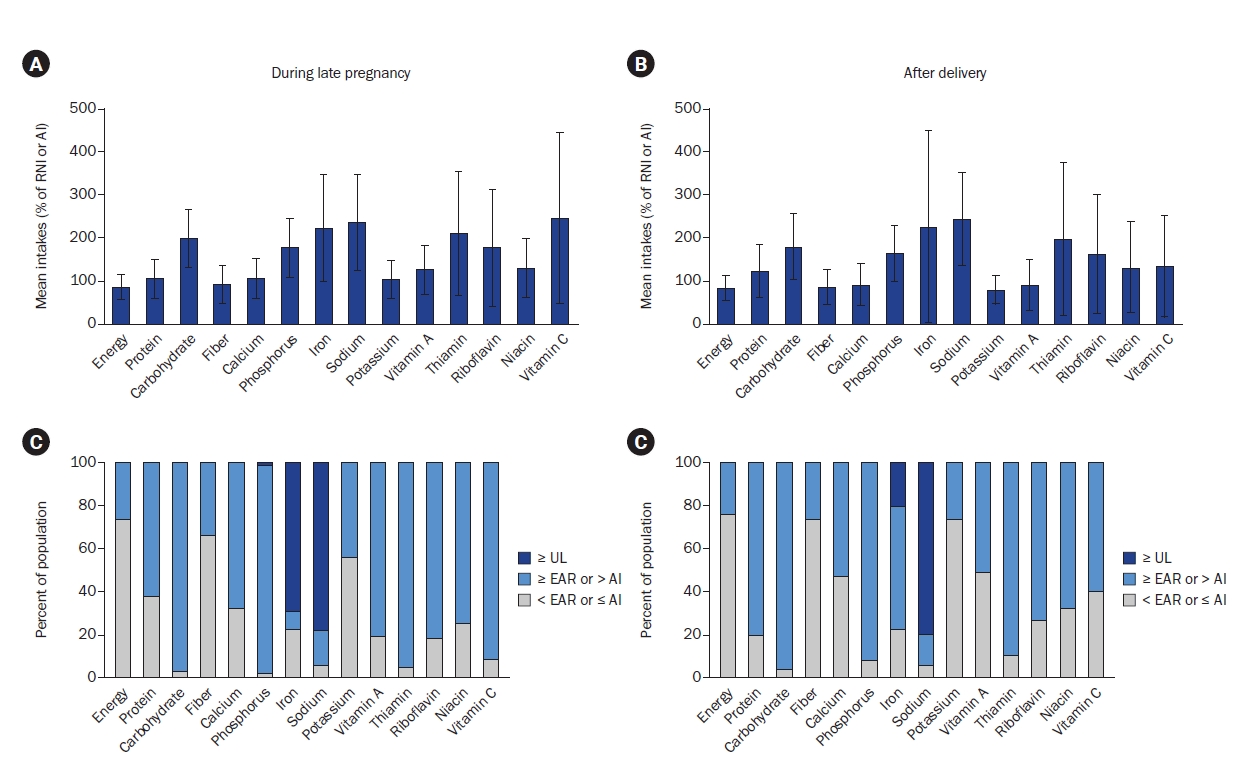- [English]
-
Food and nutrient intake in pregnant women with singletons or multiples and post-delivery changes in intake in Korea: an observational study
-
Cheawon Lee, Dahyeon Kim, Yoon Ha Kim, Myeong Gyun Choi, Jong Woon Kim, Clara Yongjoo Park
-
Korean J Community Nutr 2025;30(1):1-15. Published online February 28, 2025
-
DOI: https://doi.org/10.5720/kjcn.2024.00325
-
-
 Abstract Abstract
 PDF PDF Supplementary Material Supplementary Material
- Objectives
Nutrient intake during pregnancy and lactation is crucial for the health of both mother and offspring. Diet and nutrient metabolism potentially vary according to ethnicity and fetal number; nevertheless, recent studies validating this are inadequate. Furthermore, few studies have tracked changes in intake after delivery. We compared the food and nutrient intakes between pregnant women in Korea carrying singletons and multiples during late pregnancy and assessed their changes through postpartum.
Methods
Ninety-eight pregnant women were recruited from Chonnam National University Hospital between January 2019 and December 2023, and 48 responded to follow-up. Third trimester and postpartum intake were assessed via food frequency questionnaires and supplement questionnaires. Student’s t-test, Mann–Whitney U test, chi-square test, paired t-test or Wilcoxon signed-rank test was performed and adjustments were made for covariates.
Results
Nutrient intake was generally adequate relative to the Dietary Reference Intakes for Koreans, with no differences between singleton- and multiple-pregnancy women. Sixty-six of 98 (67%) pregnant women consumed meat, fish, vegetables, and fruit daily. Dairy intake was low, while the mean iron intake during pregnancy reached 54.2 ± 34.0 mg/d, exceeding the tolerable upper intake level, mainly owing to supplements. Postpartum fruit and vitamin C intake decreased, with no significant differences between breastfeeding and non-breastfeeding women.
Conclusion
Dietary intake did not significantly differ between Korean singleton- and multiple-pregnancy women. Dairy intake was low and iron intake was excessive. Fruit intake decreased after delivery; however, difference in dietary intake according to breastfeeding status was minimal. Nutritional education may be necessary to promote a balanced diet in pregnant and postpartum women.
Trial Registration: Clinical Research Information Service Identifier KCT0005118.
-
Citations
Citations to this article as recorded by  - Postpartum bone mineral density in Korean women: associations with lactation status and calcium intake
Cheawon Lee, Hangyeol Jeon, Yoon Ha Kim, Myeong Gyun Choi, Jong Woon Kim, Clara Yongjoo Park
Nutrition Research and Practice.2026; 20(1): 145. CrossRef - Placental cadmium and its association with maternal diet and offspring growth in Koreans
Dahyeon Kim, Cheawon Lee, Yoon Ha Kim, Myeong Gyun Choi, Jong Woon Kim, Clara Yongjoo Park
Nutrition Research and Practice.2025; 19(3): 473. CrossRef
-
7,531
View
-
67
Download
-
2
Crossref
|




